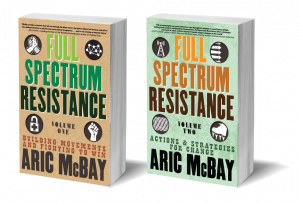We fight because we want a real future. Explaining why they fought so hard, civil rights activist Unita Blackwell said: “I guess our courage came out because we didn’t have nothing, and we couldn’t lose nothing. But we wanted something for ourselves and for our children. And so we took a chance with our lives.”34
We’ve been told that if we buy compact fluorescents and fair-trade coffee, if we vote for the right people and sign the right petitions, if we just stay positive, then not only can we avert ecological disaster but that progress will usher in a happy, green, middle-class future. But this is simply wrong. Fair-trade coffee and the like may be better than the alternative, but it’s a tiny change in a system that is overwhelmingly headed in the wrong direction.
Many of us know in our bones that this technotopia is not going to come about. But we don’t know what else to do. The alternative is terrifying. The truth is that mainstream environmental and social justice organizations have deeply misled people about what kind of change (and what scale of change) is necessary to create a livable future. They have not done this because they are bad people, but because the really large nonprofits have become corporations like any other. They have to sell a product to make money, and so they sell guilt relief and false hope.
The future they conjure cannot exist. You do not get to a happy green future by destroying the soil, air, and water. The truth is that in the long term we have very little to lose. The people who understand that they have nothing to lose—like Unita Blackwell—are those who fight the hardest. The technotopian future—no matter how well-meaning—is a false diversion that makes us feel like we have something to lose when we don’t.
We will only win when we reclaim our own future from the corporations, both in the physical world and in our collective visions.


